| Article ID | Journal | Published Year | Pages | File Type |
|---|---|---|---|---|
| 962019 | Journal of Health Economics | 2010 | 14 Pages |
Abstract
Our paper is a first attempt to evaluate the long run impact of reference pricing on pharmaceutical innovation, health and expenditures. The model is based on a dynamic game involving three types of agents: pharmaceutical firms, consumers and a regulatory entity. Pharmaceutical firms choose the level of research investment and its innovative content, then negotiate introductory prices for new drugs with the regulator. Reference pricing affects negatively the intensity of research and it also modifies the types of innovations that are brought to the market, deterring small innovations. The model is calibrated with a small data on statins in France. Our results suggest that reference pricing typically generates a decline in health, whereas discounted expenditures may decrease or increase, depending on the degree of deterrence of cost reducing innovations.
Related Topics
Health Sciences
Medicine and Dentistry
Public Health and Health Policy
Authors
D. Bardey, A. Bommier, B. Jullien,
